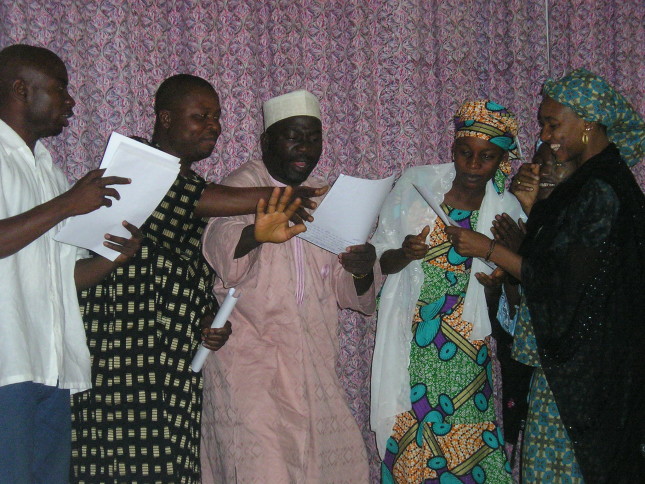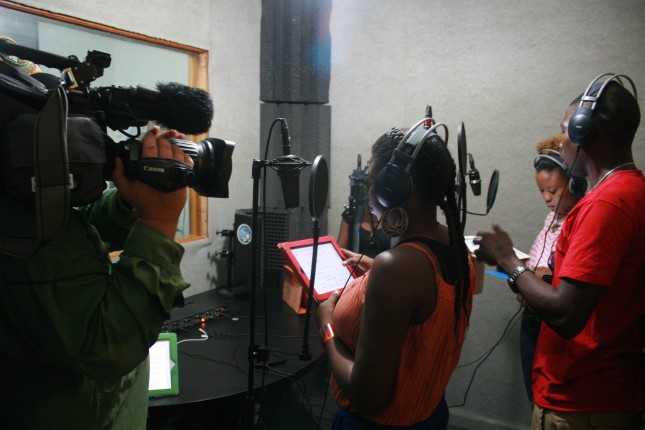-
How Soap Operas Can Help Communities Adapt to Climate Change
August 19, 2019 By Robert Walker
When thinking seriously about a world increasingly afflicted by climate change, radio and television soap operas are not the first things that leap to mind. But for countries likely to suffer the most from climate change, popular serial dramas can play a critical role in helping vulnerable populations adapt to the looming challenges.
TIME recently looked at the 10 countries likely to suffer the most from climate change, as forecasted by Verisk Maplecroft’s Climate Change Vulnerability Index. Nine of the 10 countries are in Africa, and all of them are experiencing relatively rapid population growth. According to the UN’s latest population projections, five of them—Burundi, Congo, Democratic Republic of the Congo (DRC), Guinea, and Madagascar—will likely double their population by 2050. Three of them—the Central African Republic (CAR) DRC, and South Sudan—are suffering from major conflict. Many are regarded as food insecure and all of them rank high in terms of severe poverty.
So what kind of role could serial dramas play in addressing the enormous challenges these countries now face? A significant role, actually. Over the past half century, serial dramas have been used to effect positive social change in dozens of countries in Africa and elsewhere.
The science underlying entertainment education is firmly rooted in human psychology. Research conducted by the Stanford psychologist, Albert Bandura, revealed that our attitudes and behaviors are shaped by the observations we make of people we regard as role models.
Televised soap operas played a pivotal role in expanding viewer understanding and acceptance of family planningIn the 1970s, Miguel Sabido, Vice President of Televisa, Mexico’s premier television network, consulted with Bandura about the possibility of using televised serial dramas, telenovelas, to create positive role models for viewers. After Sabido oversaw the creation of a Mexican telenovela that encouraged illiterate adults to sign up for literacy classes, enrollment in adult literacy classes soared. Shortly after Mexico lifted its ban on modern contraception in 1973, Bandura created a serial drama to expand pubic understanding and acceptance of family planning. It, too, was a major success.
In the 1980s, with support from the Population Institute, Sabido’s approach was introduced to other countries, including Brazil and India, where televised soap operas played a pivotal role in expanding viewer understanding and acceptance of family planning.
Since then, radio and television serial dramas—and other forms of entertainment education—have been used to address a wide range of challenges. As part of its Africa in Transition series, the Woodrow Wilson Center earlier this month, on July 10, hosted a panel discussion, “Educational Entertainment: Promoting Health and Social Change through Pop Culture,” that highlighted some of the applications in Africa.
William Ryerson, Founder and President of the Population Media Center (PMC), described how PMC’s programing in Africa had been used to advance family planning, improve health outcomes, promote human rights, and protect the environment. Ryerson’s cited examples some of the critical successes produced by radio serial dramas in Africa:
- After the airing of a serial drama (Twende Na Wakati) emphasizing the prevention of HIV/AIDs in Tanzania, 82 percent of listeners surveyed said the program made them change their behaviors by limiting partners or using condoms. Reflecting that shift, condom distribution in the broadcast area increased by 153 percent in the broadcast areas versus a 16 percent increase in Dodoma, a control area where the serial drama was not heard.
- In 2008, after Ruwan Dare (“Midnight Rain”) ran for two years in five states in northern Nigeria, surveys of new reproductive health clients at family planning clinics found that 67 percent cited the program as their motivation for seeking services.
- In Senegal, people who listened to Neglawu Nawet (“Winds of Change”) were 6.3 times more likely than non-listeners to say that women should be 18 years of age or older before marrying.
At the event, Anselme Muzalia Wimye, a Program Director for Search for Common Ground, described how a televised serial drama was being used in Democratic Republic of the Congo to fight police corruption by following Elombe, a fictional character, committed to maintaining the honesty and integrity of his police force. Search for Common Ground, a U.S.-based organization, has also used serial dramas to help promote peace and reconciliation in strife-torn countries.

Serial dramas in Africa are a critically important tool in remote rural areas where harmful social norms are impeding progress. When used in conjunction with programs on the ground, the results can be nothing short of transformative. In Ethiopia, for example, where radio serial dramas produced by PMC attracted regular listening audiences of up to 40 million people for nearly 15 years, dramatic progress has been made. Nationally, the modern contraceptive prevalence rate increased from 6 percent to 35 percent between 2000 and 2018. Notable progress has also been made in reducing child marriage, female genital mutilation, and marriage by abduction.
For African countries struggling with climate change, serial dramas—and other forms of entertainment education, including electronic games and theater productions—can help communities adapt to the challenges ahead. Increasing knowledge and acceptance of family planning enables women in vulnerable settings to space or limit their pregnancies, and that contributes to reduced maternal and child mortality, and smaller, healthier, and, ultimately, more prosperous families. Improvements in the status of women, particularly the education of girls, can make a significant contribution to economic productivity. In addition to advancing family planning and addressing gender inequality, serial dramas can also promote reforestation, water conservation, and sustainable agriculture. They can even be used to encourage protection of wildlife sanctuaries.
In designing their climate change adaptation plans, developing countries should give serious consideration to the role that entertainment education can play in making families and communities more resilient.
Robert Walker is President of the Population Institute.
Sources: Population Media Center, Population Reference Bureau, Simply Psychology, Time.
Photo 1 Credit: Actors work on a scene from Guga Goge, Northern Nigeria. Photo courtesy of Population Media Center.
Photo 2 Credit: A recording studio in Village Santé, Haiti being covered in a story by Al Jazeera (the camera in the shot) as the actors record a scene from Zoukoutap 2. Photo courtesy of Population Media Center.
 A Publication of the Stimson Center.
A Publication of the Stimson Center.




